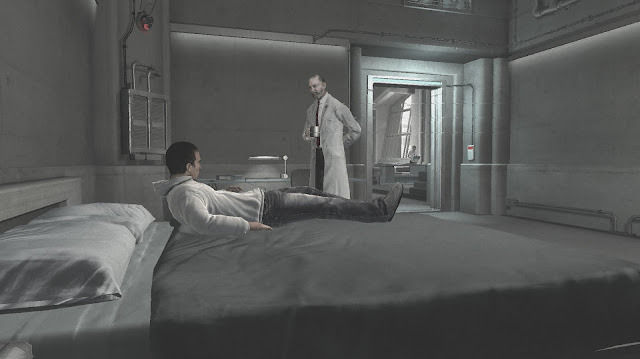 Assassin's Creed: Directors Cut (2008), developed and published by Ubisoft, Inc.
Assassin's Creed: Directors Cut (2008), developed and published by Ubisoft, Inc.Geneology, memories trapped in DNA, ancestral memories. What would you learn, what could you learn, if you could tap directly into the memories of your ancestors? These are the questions Desmond Miles faces when he is kidnapped and strapped into a machine called Animus. Desmond is not an ordinary bartender, he is of the lineage of a man called Altair, assassin extraordinaire, who existed and worked in the Holy Lands in 1191, during the 3rd Crusade.
The reason why Abstergo Industries has captured Desmond and are tapping into his ancestral past is that Altair assassinated 9 historical figures, who all had their hand in igniting the crusades. These men, Muslim and Christian alike are all members of a secret Templar Order after a mysterious artefact called the Apple of Eden, an item from long lost past, built by a civilization that preceded our own. This ancient piece of technology is what Abstergo wants, as they are just a modern facade of the Templar Order.
The story is told on two layers. The first is the current era, where we see and control Desmond in the Abstergo Industries and see him interact with the Animus machine as well as Dr Warren Vidic and his assistant Lucy Stillman. The second layer is the Animus machine, where Desmond is experiencing the memories of Altair, who is completing his given task.
Assassin's Creed is basically an action-adventure game. Altair ends up being a disgraced assassin after he almost botches a job. His superior, Al Mualim, decides to give Altair another change after he manages to foil a templar attack on the Assassin Homebase. With each successful assassinations, Altair gains more of the tools of the trade to his use as well as learns new combat skills and gets more health.
With each new mission, you travel into one of the major cities of the area. In each city, the first thing to do is to get in, after which the location has to be scouted by climbing in a tall tower to synchronize the memory. This opens up five different submission types: assassination, stealth, coercion, protection and flag hunt. Each completed mission provides info about the target and after you've gained enough info, you can do the deed.
At first Assassin's Creed looks and feels like a fantastic game. The 12th-century locations are well made and the game still looks relatively good. Parkouring along the walls, scouting and doing the mission feels fun, despite at first you have to travel to each location via a boring wilderness map. But after a while, you can quickly jump to the location
But that's just the first impression. Sooner or later you realize, that the game is basically mindlessly repeating 5 simple tasks. With every main target, you do the same task: scout, kill, save, steal or coerce. And you do it several times, as there are several synchronize spots in each city area you get to. Usually, you need to do the syncing more than 10 times, before you get all the needed missions.
In many ways, Assassin's Creed feels like a prototype, that ended up being a commercial game after someone noticed, that they could pad out the gameplay by using a small set of missions. They wrote a script, slapped in the locations and laughed on their way to the bank, considering this is a game that spawned one of the biggest modern game franchises. It also laid the groundwork for the kind of game world-building Ubisoft is currently heavily abusing by having big maps filled with a tonne of busywork in order to pad the game length.
I can't really recommend Assassin's Creed, as it really is, in the end, a rather tedious game. For the length of it, the mission types are far too repetitive and in many ways, the well-built locations feel wasted in it. It is a game, that was still trying to find itself. While some aspects in it work nicely, the sumo of the whole just isn't worth it. I say skip it and go straight to Assassin's Creed II, which I recall liking better. If you do end up playing this one, just forget about trying to collect the flags. That's just busy work with no real payout.



Comments
Post a Comment